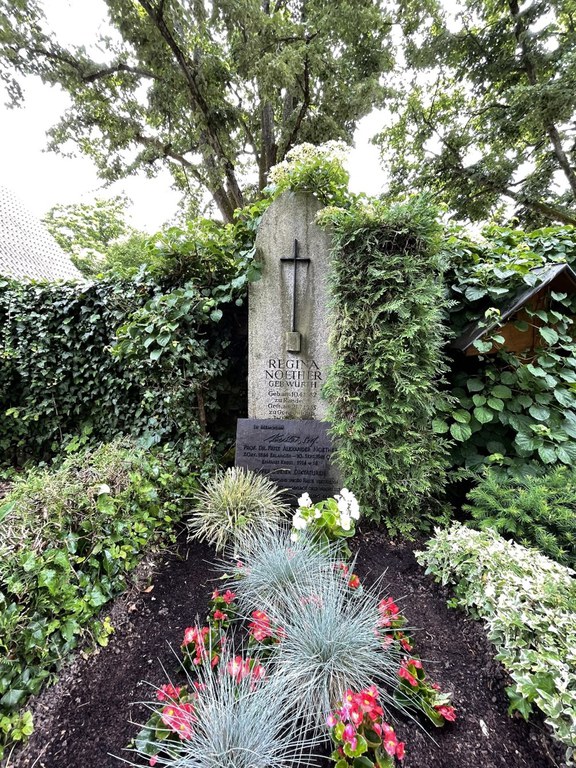Remembering Fritz Noether
The Grave of Regina Noether in Gengenbach with Commemorative Plaque for Fritz Noether
by David E. Rowe
Fritz Noether came from a distinguished mathematical family. He grew up in Erlangen as the son of Max Noether along with his older sister Emmy. After studying in Erlangen, Munich and Göttingen, he habilitated in 1911 at the Karlsruhe Institute of Technology. Only a few days afterward, he married Regina Würth, with whom he had two sons: Hermann and Gottfried Noether. Regina’s family eventually settled in Gengenbach, and during the First World War she, Fritz and their two boys lived in nearby Hausach (Engelstrasse 147). The family moved to Breslau in 1922, when Fritz Noether became a full professor at its Technische Hochschule.
Like his sister, Fritz Noether lost his position in Germany in 1933 as a result of Nazi laws designed to remove those of Jewish descent from the civil service. Emmy visited with her brother and his family for the last time during the summer of 1934, after which she returned to the US and they departed on the long journey to Tomsk in western Siberia. Fritz soon began teaching at the University of Tomsk’ Institute of Technology, while his sons continued their studies there. Regina, however, fell into a deep depression. Alarmed by her state of mind, Fritz brought her to Gengenbach so that her sisters could look after her. She nevertheless took her own life in July 1935, shortly before Fritz and his sons came to visit her in Gengenbach. Only with great difficulty did they manage to convince the local Catholic priest to grant her a burial plot in the cemetery.
This tragedy was followed by yet another when, in November 1937, agents from the NKVD came to the Noethers’ home and arrested Fritz. A few months later, his sons received orders that they were to leave the Soviet Union; they would never see or hear from their father again. After taking temporary refuge in Sweden, they eventually obtained visas that enabled them to study in the United States. Herman (now spelled with one n) took his doctorate in chemistry from Harvard and later worked as a researcher for Celanese Corporation. Gottfried studied mathematics at Ohio State and University of Illinois before entering the army and becoming a “Ritchie boy.” After the war, he took his doctorate in statistics at Columbia in 1949 and subsequently taught at Boston University and the University of Connecticut. By this time, both he and Herman were convinced that their father must have perished, but they never gave up trying to gain information about his fate. During the Gorbachev era they finally succeeded.
Following his arrest, Fritz Noether had been charged with conducting espionage on behalf of the Nazi government. Confronted with threats, including torture, he was forced to confess to these charges and received a prison sentence of 25 years. He and numerous other former German citizens were taken to the prison in Orel, a region that would soon fall to the German army once Hitler broke the Molotov-Ribbentrop non-aggression pact by launching a surprise attack on Soviet Russia. In response, Stalin decided to liquidate many of the Germans held in Russian prisons. On September 8, 1941, Fritz Noether was summarily sentenced to death for supposedly engaging in anti-Soviet agitation; just two days later, he was executed. After reviewing the documents in this case, the Supreme Court of the USSR nullified this ruling in 1989, declaring that Noether was innocent of all charges.

Herman Noether designed a plaque in his memory. It stands at the base of his mother’s gravestone and shows a replica of his father’s signature. The text reads:
In Memoriam
Prof. Dr. Fritz Alexander Noether
7. Oct. 1884 Erlangen – 10 Sept. 1941 Orel
Iron Cross 1914–1918
Victim of Two Dictatorships
1934 driven from Germany due to race
1938 charged and convicted by the Soviets
1941 executed – 1988 declared innocent
Directions: It is easy to reach Gengenbach by train (about 20 minutes from Hausach and less than 10 from Offenburg), and from the station the Friedhof is only 8 minutes away by foot. Cross over to the Leutkirchstraße and go left to the entrance leading to the Martinskirche. Regina Noether’s grave is located along the wall of the cemetery at its northernmost corner.
More information can be found in the detailed article by David E. Rowe:
Rowe, D.E. Remembering Fritz Noether in the Town of Gengenbach. Math Intelligencer 46, 63–69 (2024). https://doi.org/10.1007/s00283-023-10328-9
